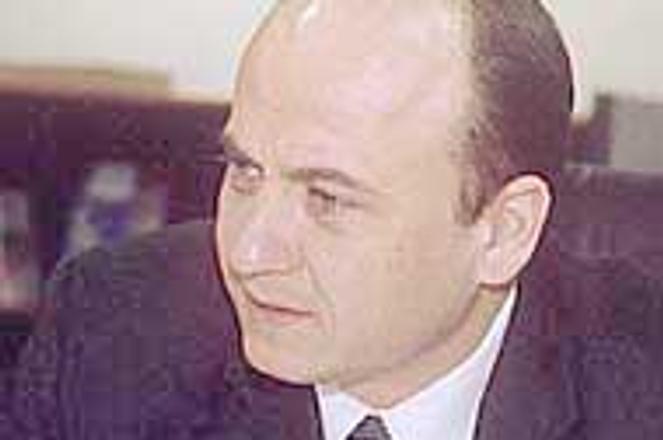Jaroslav Spišiak has broken up several gangs since taking his post.photo: Ján Svrček
A MAN who studied to become a chemical engineer is now the country's second most important policeman, and has turned police headquarters into the site of regular press conferences on success fighting organised crime.
The debonair Jaroslav Spišiak, a 37-year-old native of the southern Slovak village Veľké Ludince, says becoming a cop was part of a high school dream to fight "the bad guys" and seek adventure.
"I hated the bad guys. It's always easier to be bad than good. I couldn't come to terms with why those who at school were ill-behaved and got bad marks were more popular, and acknowledged by their peers. They were strong and they beat up whoever they wanted, and girls liked them too. I didn't like that," Spišiak says, lighting another in a succession of cigarettes.
He speaks in a curiously soft voice for a man who has turned senior police ranks on its head. He says he speaks little but "once I say something, it stands".
He has been vice-president of the Police Presidium in Bratislava for only six months, but has already won a reputation as a man of action against the country's organised crime groups.
Since January Spišiak has announced busts of an illegal alcohol ring in central Slovakia, a car theft network in northern Slovakia and a group of extortionists and murderers in the capital, who disposed of corpses by dissolving them in acid.
Spišiak says "my job is my hobby" and that he has few other interests.photo: Ján Svrček
Before he took his Bratislava post, Spišiak was police chief in south Slovakia's Dunajská Streda, then a violent and chaotic area. He admits he was the fourth choice for the post, and only won it after the first three nominees refused to take on the job of fighting the Pápayovci, Dunajská's influential and aggressive underworld group.
Ten members of the gang, including head Tibor Pápay, were shot down by a rival gang in Dunajská's Fontána restaurant in March 1999.
Having inherited a dispirited, corrupt force deeply unpopular with locals, Spišiak said his campaign, which saw dozens of Dunajská mafia 'footsoldiers' arrested and tried, was part of a simple strategy - to put the murderers in jail before they could make good on threats to kill him.
Spišiak says he has applied his 'blitz' strategy of going after mafia gunmen to his current post, explaining that plans to snare the biggest fish were "utopian", since mafia bosses were rarely directly involved in criminal acts.
"The mafia is like an octopus. You've got to gradually cut off his tentacles and suction pods - his financial resources and his people," he said.
He says the reason organised crime flourishes is that it acts as a parasite, exploiting the vices of society.
"Some people want drugs, some want cheap alcohol or gas, others want cheap cars, prostitutes, shell companies that allow tax evasion. The underworld reacts to these vices and delivers people the services they want."
He adds that organised crime has a far greater presence in the top levels of society than people realise. "In Slovakia people see the underworld as a bunch of big guys with muscles, extortionists who scare people in the streets and night clubs. But those who lead these people are often well-established in high society. Some even meet with the top people. Of course, it's not clear whether these people know who they're meeting with."
Against the mafia, says Spišiak, is a police force still under the sway of communist-style thinking.
"Police who worked under communism are professionally deformed. They feel as if they are somehow superior to the citizens. It's hard to persuade them that they serve the citizens, not vice versa."
He says police leaders must be moral and serve as a model to their officers. "We're here for the people, not for political parties or cabinet, or our own personal interests."
But securing such change, he predicts, will take several generations: a British officer once told Spišiak a similar transformation process in Britain took 20 years.
In relation to the recent spate of accidents in which drunk-driving police killed and maimed their victims, Spišiak stands by officers who "feel hurt by this and absolutely can't understand their colleagues who drink and drive."
But he says a recent decision by police to publicise rather than conceal these acts was the right one. "Hiding this won't solve anything. We must hold up negative behaviour to the light and tell the public what's being done to prevent it from happening again. That's the only way we can regain their trust."
Is the police corps having trouble swallowing so much new thinking? "Some people say I'm a strict boss, others say I'm arrogant, and some even compare me to a dictator.
"But I just want them to change and see their jobs as a service to people. Change often hurts."
Interior Minister Ivan Šimko, who put Spišiak in his job, says he is exceptionally happy with his new vice president.
"He's a criminologist heart and soul, and his work so far proves to me that I made the right choice.
"I expected less words and more deeds from the police. Špišiak is an example of such a man," Šimko told The Slovak Spectator.

